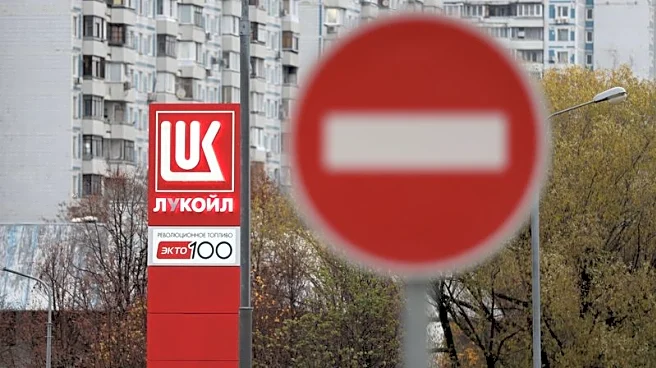By Dmitry Zhdannikov
LONDON (Reuters) -Russian energy group Lukoil's foreign empire is suitor Gunvor's biggest acquisition target to date but looks far beyond the Swiss trader's borrowing capacity, bankers
and insiders say.
Lukoil launched the sale of foreign assets on October 27 after coming under fresh U.S. and UK sanctions. Three days later it entered talks to sell to Gunvor.
The Russian company is three times bigger than Gunvor if measured by equity. Its foreign assets include refineries in Europe, shares in oilfields in Kazakhstan, Uzbekistan, Iraq and Mexico, plus hundreds of retail fuel stations around the world.
Vienna-based owner Lukoil International GmbH had equity of $22 billion, its 2024 financial report showed, with $18.8 billion worth of fixed assets such as real estate and equipment and $3.2 billion in cash.
The composition of assets and their value have not changed since 2024, said two sources close to Lukoil. The company also has no debt, according to its filings and the sources.
Gunvor, meanwhile, reported equity of $6.8 billion in 2024.
Both companies declined to comment for this story.
LENDING CRITERIA A TALL ORDER
Like most trading houses, Gunvor has a light portfolio of fixed assets and a lot of cash after generating billions of dollars in volatile oil and gas markets over recent years.
Gunvor's 2024 equity included $4.3 billion of cash and fixed assets worth about $2.5 billion.
While its cash position should help towards any acquisition, it would still need to borrow nearly $18 billion if Lukoil was valued at $22 billion.
Borrowing that much would be a stretch, said two bankers who work with Gunvor. They declined to be named because they are not authorised to speak to media.
Gunvor's debt to equity ratio stood at minus 0.6 last year thanks to abundant cash and relatively low adjusted debt of $3.8 billion. If Gunvor were to borrow $18 billion and spend all its cash, that ratio would shoot above 2, which the two banking sources said would be unacceptable to lenders.
For lending purposes banks require trading houses to have a debt to equity ratio of no more than 1.5, the bankers said.
SCRUTINY FROM COUNTRIES AND PARTNERS
The deal would also face multiple state regulatory hurdles and could refocus attention on Gunvor's ties to Russia.
Authorities in countries where Lukoil is present would have to clear the deal. Lukoil produces half a million barrels of oil per day outside Russia, or 0.5% of global oil output, from countries such as Iraq, Kazakhstan and Azerbaijan.
Furthermore, Gunvor has never managed a big oil project.
Authorities in Iraq, Kazakhstan and Azerbaijan declined to comment.
Bulgaria, meanwhile, is drafting legal changes to seize control of Lukoil's Burgas refinery, local media reported after politicians said they wanted a new owner free of Russian ties.
Gunvor has assets in Russia but has distanced itself from Moscow and has much bigger operations in the United States.
The Swiss company was once the biggest trader of Russian oil after its expansion during the 2000s, when Chief Executive Torbjorn Tornqvist co-owned Gunvor with Gennady Timchenko, one of Russian President Vladimir Putin's closest allies.
Timchenko sold out of Gunvor in 2014 because of U.S. sanctions on him. The U.S. Treasury said at the time, without presenting evidence, that Putin had investments in Gunvor and possibly access to Gunvor funds. Gunvor denied the claims.
Further complicating matters are the dozens of Lukoil projects outside Russia with oil majors such as Chevron, BP, Eni and Shell.
The projects, such as Karachaganak in Kazakhstan or Shah Deniz in Azerbaijan, give existing partners pre-emption rights to purchase assets if one of the partners, such as Lukoil, decides to sell out.
Chevron, BP, Eni and Shell declined to comment.
Gunvor is awaiting deal approval from U.S. regulators, Tornqvist said this week, adding that he has no plan to sell assets back to Lukoil if sanctions are lifted in the future.
(Reporting by Dmitry ZhdannikovEditing by David Goodman)









